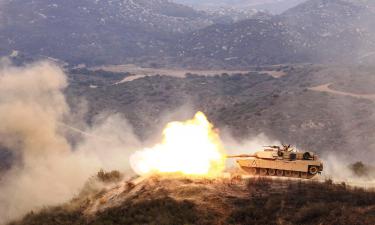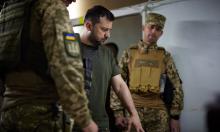Israel's new military chief of staff has hard goals to pursue
Gabi Ashkenazi, a former infantry general, was installed on Wednesday as Israel's new military chief of staff and faced the formidable task of restoring confidence in the armed forces after last year's botched war in Lebanon.

During his tenure, Ashkenazi will also have to prepare Israel for a possible military strike against Iranian nuclear facilities. He will also have to decide how to deal with continuing Palestinian rocket fire from the Gaza Strip.
Ashkenazi, who most recently served as director general of the Defense Ministry, brings with him a wealth of experience with ground troops, a quality lacking in his predecessor. Lt. Gen. Dan Halutz, a former air force chief, resigned last month over criticism of his conduct of the war, including charges that he relied too much on air power.
At his appointment ceremony, Ashkenazi said his first priority would be overhauling the military and restoring the public's trust in it after the war against Lebanese Hezbollah guerrillas.
"We must fix the flaws," Ashkenazi said in a speech at Prime Minister Ehud Olmert's office. "But there are no magic solutions."
Olmert said in a speech that Ashkenazi may face further combat with Hezbollah on Israel's northern border with Lebanon.
"The army will be required to continue the persistent and ongoing combat against terror groups and prepare for possible developments in the north even if they are unforeseen," Olmert said.
Ashkenazi fought as an infantryman in the 1973 Mideast War, took part in Israel's famed hostage rescue in Entebbe, Uganda, in 1976 and commanded major operations in the first Lebanon war in 1982 before overseeing the withdrawal of Israeli forces in 2000. He quit the army in 2002 after losing out on the top job to Halutz.
Ashekanzi had a civilian job at the Defense Ministry, and his distance from the army during the war helped to make him an attractive candidate. He was nominated by Defense Minister Amir Peretz and approved by Cabinet earlier this month.
Halutz resigned before a commission investigating the war submitted its as-yet unpresented findings. Israel went into the war with the objective of crushing Lebanese Hezbollah guerrillas and recovering two soldiers whose capture by Hezbollah sparked the fighting.
The war ended without achieving either objective, and reserve soldiers returning from the battlefield also complained of poor preparations, confused orders and lack of food, water and ammunition.
Olmert was called before the commission to testify last week, the last witness following a parade of top Cabinet ministers and military officers.
Fears in Israel and abroad that Iran is developing nuclear weapons have fueled speculation that Israel might launch a military strike against Tehran's nuclear program, as it did against Iraq's in 1981. With Israel saying repeatedly that it would not reconcile itself to Iran's becoming a nuclear power, Israeli military correspondents have noted that the military under Ashkenazi would have to prepare the air force for such an attack.
Israel has long said a nuclear Iran would pose the greatest threat to Israel and to Mideast stability.
Concerns about Iran's intentions have been heightened by Iranian President Mahmoud Ahmadinejad's repeated calls for Israel to be wiped off the map.
Olmert has not ruled out a military strike, though he has said he hoped other ways could be found to keep Tehran from becoming a nuclear power, the AP says.
Halting rocket fire from Gaza will also be on Ashkenazi's agenda. After a five-month incursion into Gaza that failed to stop the launches, the Israeli government recently approved development of a missile defense system to counter fire from projectiles by Palestinian militants as well as Hezbollah.
Subscribe to Pravda.Ru Telegram channel, Facebook, RSS!





